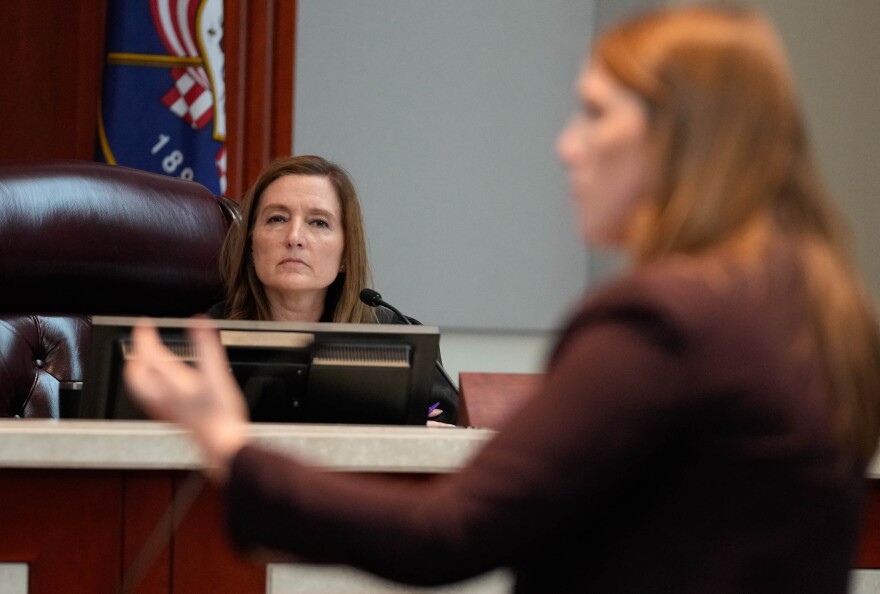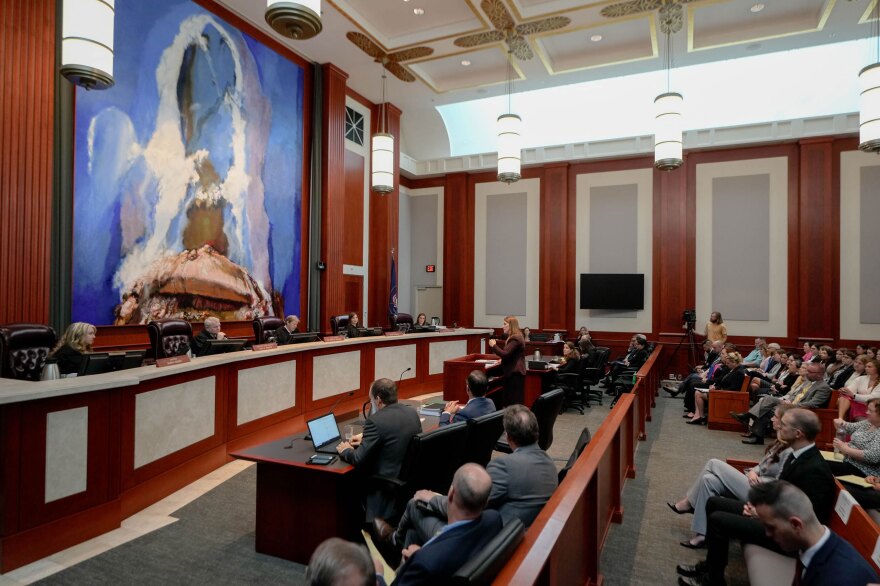Utah’s Supreme Court heard arguments Tuesday on whether a hold a lower court put in place more than a year ago on the state’s trigger law banning most abortion should continue. Utah is one of at least five states in which laws restricting abortion have been put on hold due to litigation.
The legal wrangling follows the U.S. Supreme Court’s Dobb’s v. Jackson decision that overturned Roe v. Wade and put the question of abortion regulation in the hands of states.
Utah’s Planned Parenthood, which provides the majority of abortions in the state, sued last year over the 2020 trigger law that banned abortion with exceptions for maternal health threats or rape and incest reported to the police. Since the lower court put that law on hold last summer, another law — a 2019 ban on abortion after 18 weeks of pregnancy — took effect.
Lawmakers subsequently passed additional legislation striking licensing provisions for abortion clinics from state code in an effort to phase the facilities out. That law is also on hold by the courts.
The state's attorneys want the Utah Supreme Court to overrule a lower court's decision to put the 2020 state law on hold. They argued that the “original public meaning” of the state constitution drafted during the Mormon Pioneer era in 1895 didn’t guarantee a right to abortion.
“Dobbs returned that question to the people and their elected representatives,” said Taylor Meehan, Utah's outside counsel. “There is no constitutional text, history or common law tradition that can support it, and yet the state’s law has been under stay for one year and 28 days, allowing thousands of abortions to proceed.”

Utah's majority-women Supreme Court appeared skeptical of the state's claims that the lower court abused its power in putting an abortion law on hold last year. The panel probed Utah's attorneys about arguments that the state's Planned Parenthood affiliate had not raised “serious issues” enough to merit delaying the law. Many of their questions narrowed in on a 2002 abortion case that interpreted the Utah Constitution in line with the U.S. Supreme Court’s long standing view that certain limits on abortion violated people’s fundamental rights under law.
The question at hand was whether the court's decision to affirm due process rights “in lockstep” with the U.S. Supreme Court's 1992 decision in Planned Parenthood v. Casey.
The equal protection clause in the state constitution is central to Planned Parenthood’s argument. In Planned Parenthood’s eyes, access to abortion is essential to equal access to other rights, like those of bodily autonomy or the right to determine the makeup of one’s family.
Planned Parenthood staff attorney Camila Vega told justices that the arguments are “at the very least debatable” and urged the court to keep the injunction in place as the larger court case continues.
The Utah justices are expected to decide whether to maintain the lower court's hold on abortion law or take the matter into their own hands due to the state constitutional questions at stake. Since Roe's overturning, judges elsewhere have struck down only a few such bans, including permanently blocking a ban in South Carolina on abortions after cardiac activity can be detected.
Following the hearing, supporters of the law expressed confidence in the court’s ability to fairly rule on the injunction.
“[The legal case will] go on for quite some time, but we'll win,” said Utah Eagle Forum President Gayle Ruzicka. “Babies will win. Babies always win. They overturned Roe, we can certainly win this.”

Despite believing they presented a strong case, Planned Parenthood still wanted the court to consider the ramifications of allowing the law to be put back in place.
“The Utah Supreme Court heard the devastating consequences Utahns would face should the stay of this unconstitutional trigger band be removed,” Planned Parenthood Utah CEO Kathryn Boyd told reporters on the steps of the courthouse. “Thousands will have to flee their communities to seek basic health care or endure forced pregnancies and birth against their will with profound medical risks and life-altering consequences. Every Utahn deserves the right to make their own medical decisions, to be in charge of that decision making and to get the care they want or need free from political interference.”
This story was written by Sam Metz of the Associated Press with contributions from KUER’s Sean Higgins and Jim Hill.






